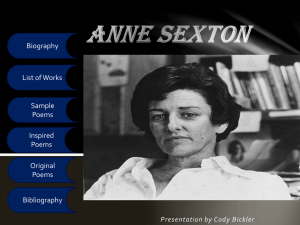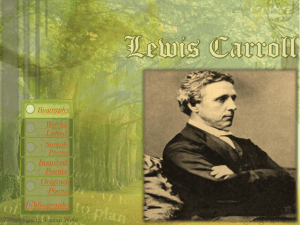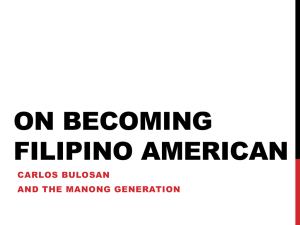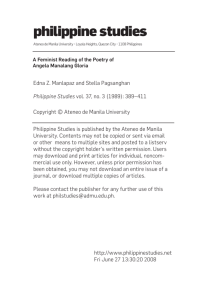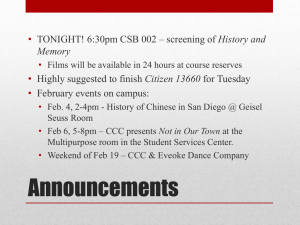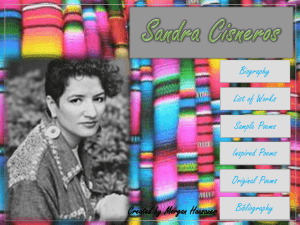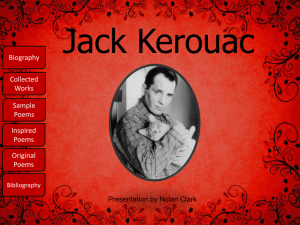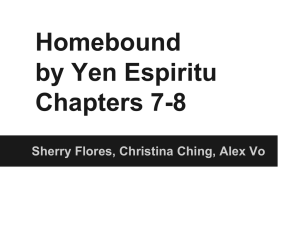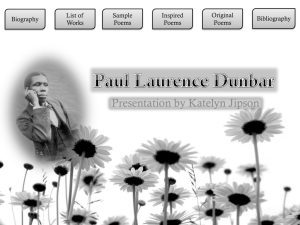group three`s powerpoint. - Philippine Writing in English
advertisement
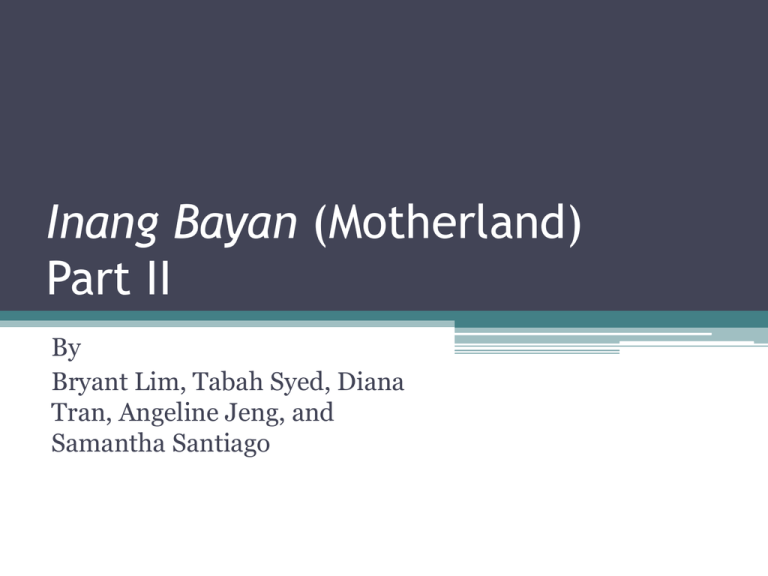
Inang Bayan (Motherland) Part II By Bryant Lim, Tabah Syed, Diana Tran, Angeline Jeng, and Samantha Santiago Necessary Fiction • Author Caroline Hau explains the Rizal Bill and its significance ▫ Relationship between literature and nationalism ▫ the state had a role in enforcing how to read Rizal’s literature • Paradoxes of literature ▫ “literary works both embodied culture and helped create that culture” ▫ Since few Filipinos read literature, it has no place in every day life Yet plays a significant role in developing the nation • “made the act of reading literature an act of (re)discovering the nation’s origins in ideals embodied by the life and works of the nation’s heroes.” Context • Language and interpretation ▫ Issue of Rizal being read in different ways Church view Nationalistic view • Literature has ability to enlighten and obstruct views of history Nationalistic Literature • Truth and action ▫ Together they materialize the relationship between literature and history ▫ Relationship meant that effective action could only take place with knowledge of the past, present, and future • Transformation of consciousness ▫ Underlying work of the state and foreign dominators • Relates to previous idea of the reinstitution of hierarchy “Excess” • The excess refers to elements that “inform, but also exceed, nationalist attempts to grasp, intellectually and politically, the complex realities at work in Philippine society” • Internal weakness because of excess ▫ Philippine literature is haunted in the present because of their past ▫ Exclusion of “excess” in the name of the nation Question • How can social change, freedom, and identity exist without a definition of “culture”? ANGELA MANALANG GLORIA • Angela Manalang Gloria was a Filipino poet in the mid 1900s. Over her career as a writer, she wrote 113 published poems, was chosen as editor of the Collegian by Celedonio Gloria, to whom she would marry, and became a founding member of the U.P. Writers Club. • Her poems often centered around love and feminism. • However, Manalang Gloria was often criticized for her writing. ▫ One man, Jose Garcia Villa often criticized her calling her a “third-rate amateur poet” at her best. ▫ An Australian writer by the name of Tom Inglis Moore stated that her poems were weak; they were formless and vague with an inaccurate use of grammar and idioms. They were truly “Filipino literature”; Sentimental and Formless Possible vs. Real Sketches (1926) Fades the Dusk? I see it In clouds of frankincense, Grey and greyer still, Wafted From Golden censers on floral chains, Nightwards… Stays the Night? Leave it so— A lyre of ebony Draped in spangled gossamer, Sepulchered in a subterranean tomb, And untouched Forever… • Her earlier poems were very disorganized • There was no proper format • And they all seemed have very dark imagery • After hearing a lot of criticism, Manalang Gloria would go about her years questioning this, questioning the solution to the formlessness of her poems. • She would find answers from the influence of other female poets like Sara Teasdale where she would then learn metric styles • Manalang Gloria also shifted from writing about possibilities to writing about real life; defining the self by shifting from imagined life to actual life, a life with pain. • She had a great number of supporters ▫ Gemino Abad, in 1982, said she was the best Filipino poet next to Jose Garcia Villa • Today, her poems attracted two groups of readers ▫ The first group are typically young women who are reading the poems for the first time and relating to the feministic genre in such a patriarchal world ▫ The second group are people who reread the poems to “create new meanings” behind the poems. • Why were her earlier works so criticized and what was the shift that made them gain more respect? • Her experience of the real world had disabused her romantic illusions. • Got tuberculosis in 1930, relapse in 1935 • The Lie- crisis of faith • Recovered from tuberculosis in 1937. ▫ The Debt shows gratitude • Paradox- scholastic star vs. housewife ▫ Wisdom is a motif in later poems ▫ Wisdom is recognition of the gap between life-asit-was-once-imagined-to-be and life-as-it-wasactually-experienced • Year 1940: Published Poems in sequence of her life: longing romantic love courtship and marriage death of a friend illness and recover maturity and wisdom • First collection of poetry written in English by a Filipino woman. • made up largely of highly lyrical poems exploring a woman’s private world of personal relationships and passion • Didn’t win the Commonwealth award ▫ Judges based their objections on poems dealing with female sexuality. ▫ Judge based on “social relevance” ▫ “Red-blooded literature” Revolt from Hymen O to be free at last, to sleep at last As infants sleep within the womb of rest! To stir and stirring find no blackness vast With passion weighted down upon the breast, To turn the face this way and that and feel No kisses festering on it like sores, To be alone at last, broken the seal That marks the flesh no better than a whore’s! • Gemino comments, compared to da Costa’s poems, her work is “…even more distinctly Filipino.” • 1950:published student edition of Poems but was forced to delete several poems ▫ Ex: had to change “whores” to “golden bores” in Revolt from Hymen Critiques of Poems • 1940: Cornelio Faigao: refused to privilege Coasta’s poetry over Manalang’s. ▫ Described Manalang’s poem as fragile and passive. • 1950: emerge of “modern poets.” her poems were virtually ignored. • Neglect has been compounded by prejudice. Contrary to popular impression of her work, only half of Gloria’s poems are on love. Others being on such diverse themes as illness and death, poetry and criticism, faith and unbelief, and sexuality and war. • 1982: Gemini Abad comments, “…Especially when she probes her passion and pride, the delicacy of her feeling, being so finely worded, gains a kind of strength and grace which removes the dross of the merely sentimental or inauthentic.” • 1989: Edna Zapanta Manlapaz and Stella Paganghan comment, “Manalang has much to say from within the ‘wild zone’ of women’s experience, her voice is ‘muted’ by the male culture dominant in Filipino society.” Question What makes Manalang’s work “even more distinctively Filipino?” Salvador Ponce Lopez • • • • • • (1911-1993) Born in Ilocos Norte Studied at the University of the Philippines (UP) o Drama Critic for the Philippine Collegian o Member of Upsilon Sigma Phi o 1931, Bachelor of Arts degree in English o 1933, Master of Arts degree in Philosophy 1933-1936, Professor at University of Manila 1940, “Literature and Society” o Commonwealth Literary Awards o Against “art for art’s sake” Appointed Secretary of Foreign Affairs o Ambassador to the UN for 6 years o Ambassador to France for 7 years 1969-1965, President of UP o 1970, “First Quarter Storm” o 1971, “Diliman Commune” Rafael Zulueta da Costa • • • • • • Born in Manilla in 1915 Studied at De La Salle College Specialized in business administration Executive at San Miguel Brewery First Collection of Poems was First Leaves Famous for Like the Molave o Published in 1940 by Carmelo and Bauermann o Won the 1940 Commonwealth Literary Contest (beats Jose Garcia Villa’s entry) o Do actions speak louder than words? Are protests or writings more effective in bringing about change? Like the Molave • Author: Rafael Zulueta da Costas • Time: 1940 • Winner of Commonwealth Literary Award for Poetry • Cries for Jose Rizal • Molave: Hard and durable indigenous tree ▫ Mentioned in Quezon’s speech(prior to poem) ▫ Referenced in Arguilla’s “A Son is Born” for its properties of strength and durability ▫ “Like the molave, firm, resilient, staunch,” “Would you have me sugarcoat you?” • Focuses critically on the younger generations • Details the youth of the land ▫ “…are a bitter pill to swallow.” • Highlights the complacency of the youth ▫ “We are secure under the Stars-and-Stripes.” ▫ “I speak English…can lisp a little Tagalog.” ▫ “We Manilans are really cosmopolitan.” • Still calls for independence Incite Inang Bayan, Denounce the Others • “…Arise, not out of the ashes of the past, but out of the standing materials of the present.” • Counters American’s perceptions and claims ▫ In contrast to an anthem, Filipino “songs are legion but all songs are one.” ▫ In response to claims of being suckered: “…You are not a sucker. Philippines, you are the molave child…” • Philippines – (Spain + America) = MOLAVE • “Gods walk on brown legs.” Different Authors, Same Story? • Jose Rizal recognized as Philippine hero • R. Zulueta da Costas recognized for poetry • Various female authors go unnoticed ▫ Victoria Laktaw, “Our Plea” ▫ Angela Manalang-Gloria, “Revolt from Hymen” • Are the narratives of these poems same? What about their implications?


